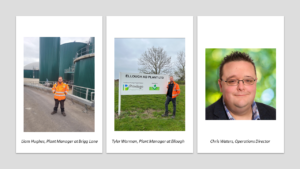Carving a career in renewables: the importance of training and development in the sector
Two site managers from the east of England, Liam Hughes and Tyler Warman, were shortlisted for the REA’s Young Renewable Energy Professional Award for their career achievements and potential to be future leaders in the industry. Both hauling from careers outside of the renewable energy sector, they received the right training and opportunities from Eco Verde Energy (EVE) to support them in their goals.
As the UK works towards net-zero, an abundance of employment opportunities has been coming to the fore. The renewable energy sector specifically is reported as having the potential to create up to 150,000 jobs by 2030. However, limited courses specialising in renewable energy operations could deter individuals from entering the sector and many say more could be done to attract and retain talent in the industry.
Chris Waters, operations director at specialist anaerobic digester plant operators, EVE, highlighted the issues around recruitment in the renewables sector and explained how EVE has overcome this. “It is difficult to find people with experience in renewables, especially with expertise in anaerobic digestion.
“But we have worked hard to bring people from outside the industry into the sector and create a strong dynamic workforce of young talent through training and career development prospects.” He explains that with the right mindset, access to training and a feeling of value, fresh talent can thrive in the sector, as was the case with both young achievers, Liam and Tyler.
A change of career for Liam
After leaving the military in 2018, Liam began his renewables career working as a plant operator at an agricultural AD plant. He joined the team at EVE in a similar role just over 18 months ago and has jumped up the career ladder at pace.
“I was delighted to achieve a promotion to assistant manager after a short time working at the Brigg Lane Biogas plant, which was followed by a step up to site manager,” said Liam.
Joining the renewables industry was a big career change for me. Renewables was a completely new sector but embracing every opportunity which arose and using my peers to further my knowledge has had a huge benefit to my career,” he added.
Liam has worked closely with the wider EVE team to implement new strategies and structures at the Brigg Lane Biogas site, which saw the plant being ranked as the highest scoring site for health and safety, compliance and performance against the other EVE sites.
“I’m always looking for ways to do my job better and develop myself as a leader,” he said. “Learning from those around me has been vital for my development and enabled me to step up within the team to site manager.”
A career ladder acceleration for Tyler
Tyler started his career by completing an apprenticeship in electromechanical engineering, where he worked across a variety of industries including the water sector and the food manufacturing industry.
“Following my apprenticeship, I began working at an AD plant in Suffolk as a site operator. The plant was taken over by EVE in 2020 and within three months of this acquisition, I was promoted to site manager, which is something I am really proud of.”
Since becoming site manager at Ellough AD site, Tyler has transformed the operation of the site and the plant is now consistently producing 100% output.
“The work myself and the team have done at the site has enabled high amounts of energy to be produced to provide heat for up to 8,000 homes,” he added. Recognising the role of renewables has supported Tyler in excelling in his career. “I am really passionate about renewable energy and using AD as a means to support the journey to net-zero. The opportunities are only going to increase in the future which is why recruitment in this industry is so pivotal to keep up with the growth.
“Through my own experience and training I have put a lot of time into supporting the recruitment process here at EVE. Coming into the role from outside the sector has taught me that anything is possible, as long as you have the right frame of mind and a passion to do well. That’s what we now look for in the individuals we employ.”
Mindset and training
Both Liam and Tyler agree that there are three important elements which enable people to progress within a career in renewables: possessing the right mindset, access to training and working within a culture where everyone feels valued.
Coming from roles outside of the sector, both are aware of the lack of individuals with qualifications in renewables specifically. However, both concur that, providing an individual possesses the right mindset, it is possible to recruit from outside of the industry and train people up.
“If you have a proactive nature and an appetite to learn more, then career diversification and progression is more than possible,” said Liam. “I had not previously considered a role in AD, but the availability of a local job enabled me to take the leap into the sector and build a new skillset.
“It’s about taking those opportunities in front of you and making the most of them,” he explained. “Sometimes you have to have that mindset to push yourself out of your comfort zone and learn something new.”
Tyler agreed and added, “Not only do employees need to have the right mindset, so do employers. Employers need to be open-minded to people’s skills. As long as people have the basic skills, are well-driven and have a desire to succeed, then training can be provided to build on those areas where further education is required.
“There’s a lack of AD-specific experience within the industry and ‘on paper’ someone may not hold any qualifications, but as long as they have the right attitude to learning and a good eye for detail then they are more than capable of being a competent operator and progressing through the ranks.”
Tyler and Liam both acknowledged the value of external and internal training when developing individuals in a team. “You can learn so much through external training courses but also internally through your peers and their past experiences,” said Tyler.
“Your own experiences are also crucial to your self-development and mine have enabled me to progress through my career at pace,” he explained. “For example, within the team we turn resolutions to problems into standard operating procedures, ensuring we document how we have overcome an issue and then sharing this with the wider team to support them in similar experiences.”
Value culture
Chris pointed out that recruitment is difficult in the current climate, and retention is even harder, so it is important to listen to your site managers and other employees and act on their feedback.
“There is no AD-specific qualification, which is why we chose to take the route of recruiting people from outside of the sector,” he said. “It is therefore really important to sit down with your employees and understand their career aspirations and areas where they feel they want to develop.
“There are many professional accreditations and relevant courses we can send our team on to help them further their knowledge in specific areas. Identifying those areas of development and offering opportunities can enable the team to progress.”
He added: “The team also need to be confident to ask for help when they need it. You can learn so much from other people by asking a couple of questions, but sometimes people do not always feel comfortable asking.
“That’s why we have created a culture at EVE where everyone feels valued and able to ask questions of their peers.”
Chris explained that where similar questions are asked frequently, it can identify areas where the whole team may need further training to ensure EVE continues to operate a safe working environment.
“With a good support from leadership, employees who are passionate about renewables and ample training, it is more than possible to recruit and retain good talent in the sector.”
Originally published by Bioenergy Insight



